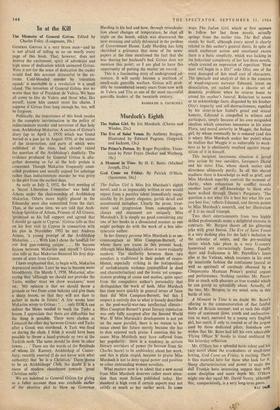Murdoch's Eighth
The Italian Girl is Miss Iris Murdoch's eighth novel, and is as impeccably written as one would expect from a positive talent immediately recog- nisable by its jaunty elegance, garish detail and accentuated metaphor. Clearly the prose, treat- ment and progression from conception to climax and statement are uniquely Miss Murdoch's. It is simply no good considering any one of her books in a dissociated manner as one might perhaps do with the work of a less idio- syncratic author.
In her literary persona Miss Murdoch is as un- commonplace as Miss Compton-Burnett, of whom there are traces in this present book, although Miss Murdoch's idiom is more evidently modern. The similarity between these two novelists is traditional in their points of resem- blance, especially striking in the juxtaposition of melodramatic violence (exemplified in deed and characterisation) and the ironic yet compas- sionate probing of cause and motive, quite apart from the compulsive author's personality that distinguishes the work of both. Miss Murdoch has risen more quickly in general terms of fame than did Miss Compton-Burnett, but this I suspect is entirely due to what is loosely described as the post-world-war-two intellectual climate: Miss Compton-Burnett's great literary reputation was only fully accepted after the Second World War. If Miss Murdoch's development is not yet on the same parallel, there is no reason to be mean about her future merely because she has to date enjoyed such praise. I mention this be- cause Miss Murdoch may have suffered from her popularity: there is a tendency in certain literary corridors of power (to borrow from Sir Charles Snow) to be ambivalent about her work, and this is plain stupid, because to praise Miss Murdoch is not to deny equal power and position to other outstanding women novelists.
What matters now is to admit that a new novel from Miss Murdoch deserves rather more atten- tion than most fiction published today. Her standard is high even if certain aspects may not satisCy as much as her earlier work. In some ways The Italian Girl, which at first appears to follow her last three novels, actually springs from the earlier trio. The Bell alone stands by itself, although every novel is clearly related to this author's general thesis. In spite of much exuberant action and emotional excess there is a basic simplicity, which was lacking in the behaviour complexity of her last three novels, which created an impression of repetition. 'How does evil begin in a life?' asks Otto, one of the most damaged of this small cast of characters. The spectacle and analysis of this is the concern of wood-engraver narrator Edmund, intent on dissociation, yet sucked into a chaotic set of domestic problems when he returns home to attend his mother's funeral. Reluctant to assess or to acknowledge facts, disgusted by his brother Otto's impurity and self-destructiveness, repelled by his sister-in-law Isabers greed and sexual honesty, Edmund is compelled to witness and participate, simply because of his own misguided idealism which conceives innocence in his niece Flora, and moral austerity in Maggie, the Italian girl, by whom eventually he is seduced (and this is where Miss Murdoch makes her point) when he realises that Maggie is as vulnerable to weak- ness as he is obstinately resolved against recog- nition of it in himself.
This incipient incestuous situation is jarred into action by two outsiders, foreigners David and his sister Elsa, whose shock tactics and directness ultimately purify. In all this shared madness there is knowledge as well as grief, and Miss Murdoch superbly controls the moment of clarity, when exhaustion by conflict reveals another layer of self-knowledge to those who have walked through Dante's Purgatory. The question is not what life is best but what life can you best live,' reflects Edmund, and therein points to Miss Murdoch's research, and her illustration of it is no small triumph.
Two short entertainments from two highly skilled professionals make a delightful exercise in contrasts. Mr. Burgess shoots off his glittering joke with great finesse. The Eve of Saint Venus is a very dashing plea for the lady's inclusion in the calendar of saints, and the pre-wedding antics which take place in a very U-county homestead are excruciatingly funny. Equally short and frolicsome is Mr. Peyrefitte's latest gibe at the Vatican, which recounts in his own sly inimitable fashion the confusions (moral as well as spiritual) of cardinals obsessed by a Cinquecento Mantuan Prince's genital organs and performance. Nothing ravishes Mr. Peyre- fitte so much with pleasure as true scandal which he can gossip so splendidly about. Actually, of the two, Mr. Burgess, to my mind, wins in this battle of wits.
A Moment in Time is no doubt Mr. Bates's offering to the commemoration of that fateful Battle of Britain summer, and as such this slight story of sentiment (love, youth and acclimatisa- tion to war), narrated by a young very English girl, has merit, if only to remind us of the jargon used by those dedicated pilots. Somehow One wishes that Mr. Bates had left his own admirable 'Flying Officer X' books to stand undiluted bY this latterday reflection.
Mr. O'Hara has a splendid basic talent and his racy novel about the crookedness of small-time boxing, God Caine on Friday, is exciting. There is film material here for those who look for it. Sharp characterisation and power to make the dull Frankie hero interesting suggest that with some discipline and more depth Mr. O'Hara might one day equal Mr. David Storey, although this, comparatively, is a very long-term guess.
KAY DO






























 Previous page
Previous page